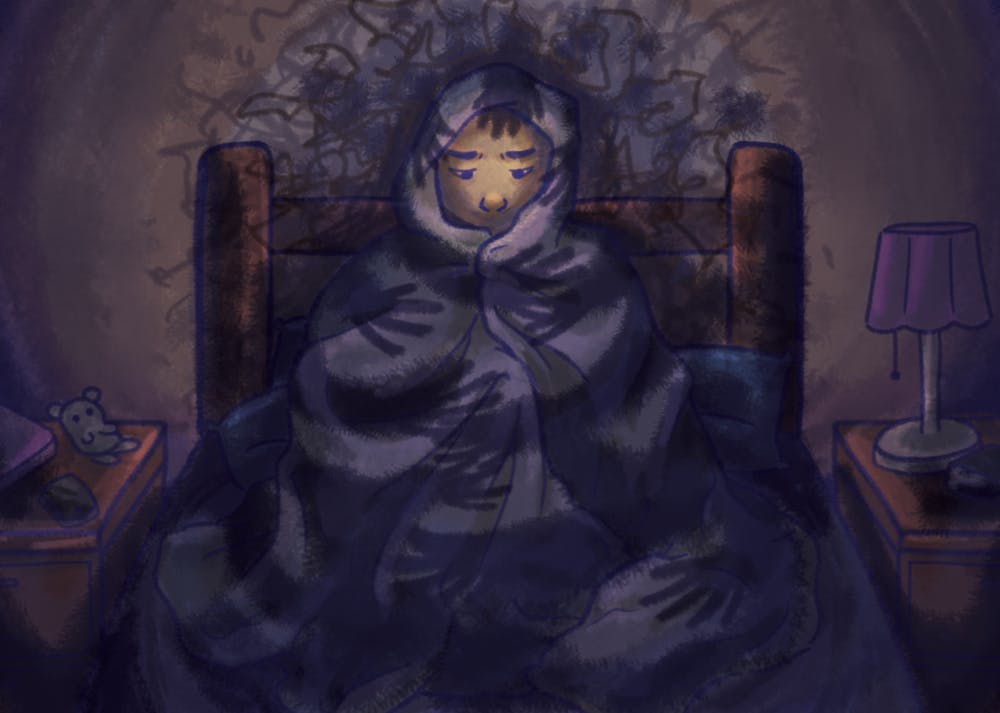The lights are dim, the curtains gray, the spastic sunlight is seeping in through the cracks in the blinds.
My head is underneath the covers — the warmth it provides is fleeting. It is enough to sustain my current emotional state, but not enough to do anything else.
Daily appointments, Zoom classes and familial obligations are stacked up like the towering cardboard pancakes at the IHOP near campus. And I just canceled coffee with my friend for the fifth time.
The symptoms and experiences of depression often come in different shades and hues. The disease is different for everyone, and no two individuals' experiences could ever be exactly the same.
For myself, these symptoms often presented as above: long days spent in bed with the covers draped over my head, avoiding responsibilities, friends and sunlight like the IRS.
Humans have faced depression for millennia; the ailment is nothing new. Much has been written from the perspective of the depressed, ranging from what it's like to be in such a state to even the economic and social impacts of suffering from the disease.
One perspective, though, I found was mostly missing from the cultural canon — the perspective of both falling into and coming out of depression. This piece prefers to focus on the latter of those two.
Aside from the experiences of depression that are seen as somewhat common, everyday knowledge, there are fast swaths of experiences that lie deep within the minds of those who suffer.
I cannot directly show what it's like to know much of what you do is wrong, yet have little capacity to do what is right. I struggle to dictate the feelings which transpire when you see friendships wither away like the roots of trees long deceased. The experience of leaving depression, though, is one I’ve been experiencing deeply over these past few months.
Initially, the comeback of old thoughts and feelings was shocking.
I fell into a state of perpetual confusion, often brought back to meandering on old memories from before the depressive spell had started. I couldn’t tell if these feelings, or any of this, was real. Or if I was simply falling deeper into the illness.
As time went on, however, and the evidence painted a compelling case of true and somewhat lasting recovery — I fell in love with what it meant to feel.
Remembering what it felt like to feel the sun on my skin and not shy from its galactic shimmer, to once again feel the joy of falling into a deep and comical obsession with a new indie-pop artist. It was like witnessing the glory of a Jackson Pollock painting, in full, perfect sight, after being colorblind for two and a half years.
Especially surprising was learning that people weren't as ill-intentioned as I once thought. When I fall deep into the thunderhead of depressive thinking, I often condition myself to believe the worst in people, or rather that people see the worst in me.
Cruel glances like lightning strikes and biting diction as thunderclaps, being around people becomes a suffocating climb through the stratosphere. Bringing myself out of the dark clouds allowed me to see that people are well-meaning and well-intentioned — even the not-so-great ones.
Now the days, full of both good and bad, are longer (in the best way possible).
I relish little moments when I'm streaming video games with the boys or having impromptu picnics in the park with close friends.
When the nights turn long, I feel the faces of those old ugly, destructive habits begin to reveal themselves. I tend to worry that the days will once again turn into endless night, and I'll once more be trapped in that same state of suspended animation.
However, I'm beginning to trust myself and my ability to tame my inner demons, and I'm learning that night can be just as enriching as day.
The sun is one star of many, and to see both its rise and fall in day, coupled with the glisten of the moon and the dances of the faraway stars: this is to bask in the breathtaking impermanence of life.
Reach the reporter at cbeal4@asu.edu and follow @beal_camden on Twitter.
Like The State Press on Facebook and follow @statepress on Twitter.
Continue supporting student journalism and donate to The State Press today.




